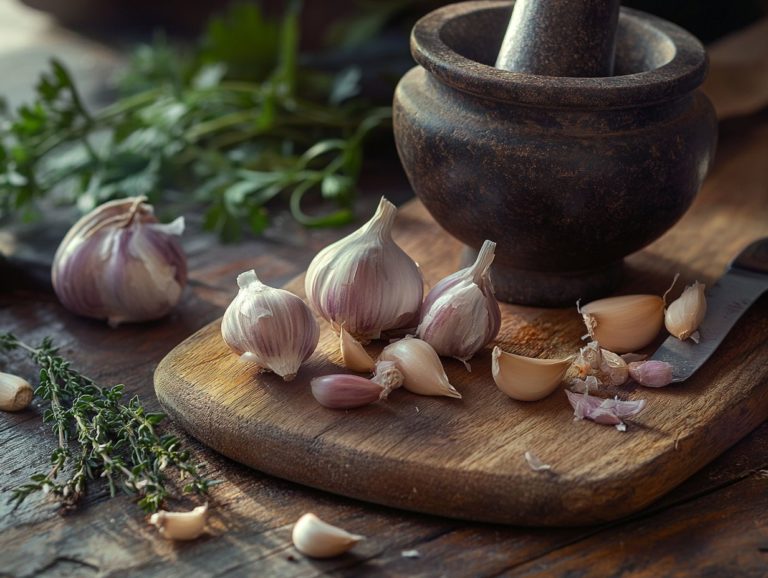Exploring the Power of Echinacea
Echinacea, often celebrated as a remarkable natural remedy, has a rich history deeply embedded in traditional medicine. Known primarily for its immune-boosting properties, this vibrant flower captivates health enthusiasts and herbalists alike.
Are you ready to explore the various types of echinacea? Uncover its potential health benefits and learn how to seamlessly incorporate it into your wellness routine. Explore possible side effects and the latest research, empowering you to make informed choices about this powerful plant.
Dive in and discover the multifaceted world of echinacea!
Contents
Key Takeaways:

- Echinacea is a herb with a long history of traditional use for various health issues. Its immune-boosting abilities make it a popular supplement for colds and flu.
- Different types of Echinacea have unique health benefits, with various species and varieties offering different levels of effectiveness.
- Echinacea supports the immune system and may provide other benefits. However, it is important to be aware of potential side effects and interactions, and to follow recommended dosages and precautions.
What is Echinacea?
Echinacea, often referred to as the purple coneflower, is a storied medicinal herb celebrated for its impressive health benefits, especially its ability to boost the immune system.
This herbal remedy, sourced from species such as Echinacea purpurea and Echinacea angustifolia, boasts a rich history rooted in Native American traditions. Today, it’s embraced in modern dietary supplements meant to support immune function and enhance overall wellness.
History and Traditional Uses
The history of Echinacea is deeply rooted in its traditional uses by Native Americans, who cherished this herbal remedy for its remarkable health benefits, particularly in treating wounds and infections.
This esteemed plant piqued the interest of early American explorers like Lewis and Clark, who meticulously documented its significance during their journeys. They noted how various tribes used different species of Echinacea to address ailments, from the common cold to snake bites. Even President Jefferson acknowledged its medicinal potential, cultivating it at Monticello.
The effectiveness of Echinacea as a natural remedy for boosting the immune system and alleviating respiratory issues reflects its rich historical background and underscores its lasting importance in herbal medicine today. This ancestral knowledge has transcended generations, highlighting the plant’s vital role in holistic health practices.
Types of Echinacea
Echinacea includes several species, with Echinacea purpurea and Echinacea angustifolia being the most well-known in herbal medicine for their remarkable health benefits and exceptional immune-boosting properties.
Different Species and Varieties
The two main species of Echinacea, Echinacea purpurea and Echinacea angustifolia, offer unique profiles in their effectiveness as herbal remedies.
While both varieties are celebrated for their immune-enhancing properties, Echinacea purpurea is particularly appealing due to its higher concentrations of natural compounds like echinacoside and polysaccharides, which may enhance your body s immune response and help fend off common infections.
On the other hand, Echinacea angustifolia is valued for its specific alkylamides, making it a preferred choice for its anti-inflammatory effects and ability to ease symptoms of respiratory infections.
By understanding these differences, you can make informed choices about which species aligns best with your health needs and herbal preferences, aiding you in your journey toward natural wellness.
Health Benefits of Echinacea

Echinacea is celebrated for its many health benefits, particularly its ability to enhance your immune system, alleviate cold symptoms, and offer support during respiratory infections. This makes it a cherished staple in countless wellness routines.
Immune System Support
The primary health benefit of Echinacea is its remarkable ability to support your immune system, enhancing your body’s response to colds and upper respiratory infections. This herb serves as a natural ally in strengthening your defenses, proving especially valuable during the cold and flu season.
By stimulating the production of cells that help fight infections and promoting a quicker response to pathogens, Echinacea enables your body to combat infections more effectively. With various forms of Echinacea available like teas, extracts, and capsules you have options meant to provide these immune-boosting benefits. Each form works through its unique mechanisms, whether by increasing the number of white blood cells or enhancing other vital immune functions.
Incorporating Echinacea into your daily wellness routine may help you navigate seasonal illnesses with greater ease and resilience.
Other Potential Benefits
Along with supporting your immune system, Echinacea offers a wealth of potential benefits, such as anti-inflammatory properties, improved skin health, and even relief from anxiety symptoms.
This versatile herbal remedy has shown an ability to reduce inflammation, making it particularly advantageous for those dealing with chronic inflammatory conditions. Regarding skin health, Echinacea may help wounds heal and reduce skin irritation, appealing to anyone seeking natural skincare solutions.
For respiratory infections, it plays a vital role in easing symptoms, providing a natural alternative to bolster respiratory function. Its calming effects can also help you reduce anxiety, allowing you to cultivate a greater sense of balance and well-being in your daily life.
Discover How to Use Echinacea for Optimal Health
Echinacea offers a variety of options for your wellness regimen, from soothing echinacea tea to potent tinctures and convenient supplements. This versatility makes it easy for you to weave it into your daily health practices.
Forms and Dosages
Echinacea comes in various forms, including tea, tinctures, and dietary supplements, with recommended dosages tailored to your individual needs and health goals.
When selecting the right form of Echinacea, consider factors such as personal preference, ease of use, and specific health objectives. If you enjoy a soothing beverage, echinacea tea could be your go-to choice for comfort. Conversely, if you seek concentrated effects, tinctures might suit you better, as they often provide a more potent dosage.
Dosage guidelines vary, but standard recommendations suggest taking between 300 to 500 mg of dried extract up to three times a day for supplements. If you choose tea, steep about 2-3 grams of the herb in hot water for optimal results.
It’s vital to consider your body weight, age, and overall health when determining the right dosage to ensure you’re using Echinacea safely and effectively.
Possible Side Effects and Interactions

While Echinacea is generally safe for many individuals, it’s important to be mindful of potential side effects, interactions, and health risks that may arise from its use, especially if you have specific health concerns.
Precautions and Warnings
It’s essential to take specific precautions when using Echinacea, particularly if you have autoimmune diseases or are prone to allergic reactions.
This herbal remedy is popular for its immune-boosting properties, but it may carry significant risks for sensitive individuals. Consulting a healthcare professional is vital to avoid any interactions and keep your health on track!
If you’re pregnant or breastfeeding, seeking guidance is crucial, as the effects of Echinacea on fetal and infant health are not well understood. Ultimately, being aware of Echinacea’s potential side effects promotes safer usage and leads to better health outcomes for you.
Start incorporating Echinacea today to feel your best during the cold season!
Research and Evidence for Echinacea
Extensive research on Echinacea reveals compelling evidence of its health benefits, notably its capacity to enhance immune function and diminish the occurrence of colds and respiratory infections.
By adding Echinacea to your daily habits, you can potentially bolster your immune defenses and navigate the cold season with greater resilience.
Current Studies and Findings
Recent studies have shed light on Echinacea’s impressive ability to enhance immune function and its potential role in preventing upper respiratory infections.
Research published in the Journal of Immunology particularly underscores the herb’s capability to boost your body s production of immune cells, which are cells that help fight off germs and infections, and alleviate the severity and duration of cold symptoms.
A study by the National Center for Complementary and Integrative Health found that participants who incorporated Echinacea into their daily routine encountered fewer respiratory illnesses compared to those who opted out.
These findings show that using this natural remedy can help tackle common health concerns. This could be your secret weapon for better health!
Frequently Asked Questions
Curious about Echinacea? Here’s how it can help!

Echinacea is a flowering plant that has been used for centuries as a natural remedy for a variety of ailments. It is believed to work by stimulating the immune system, helping the body fight off infections and illnesses.
Wondering how Echinacea can benefit you?
- Boosts immune function
- May reduce cold symptoms
- Potential anti-inflammatory properties
Is Echinacea safe for everyone to use?
Echinacea is generally considered safe for most healthy adults. However, pregnant or breastfeeding women, as well as those with autoimmune diseases, should consult with their healthcare provider before using Echinacea.
How should I take Echinacea for maximum effectiveness?
Echinacea is available in various forms such as capsules, teas, and tinctures. Follow the instructions on the product label for the recommended dosage and frequency of use. It is best to start taking Echinacea at the first sign of illness for optimal results.
Can I use Echinacea as a preventive measure?
While Echinacea is commonly used to help boost the immune system, there is limited evidence to support its use as a preventive measure. It is best to consult with a healthcare provider before using Echinacea for this purpose.
Are there any potential side effects of using Echinacea?
Some people may experience mild side effects such as upset stomach, nausea, or dizziness when taking Echinacea. It may also interact with certain medications, so it is important to inform your doctor before using it.
Ready to boost your immune system? Talk to your doctor about Echinacea today!





